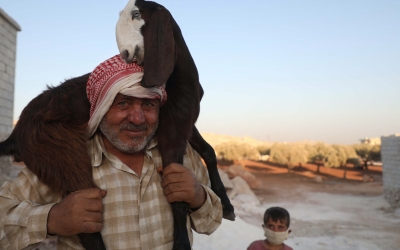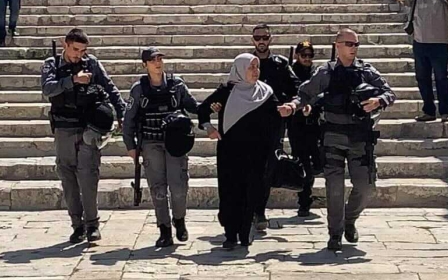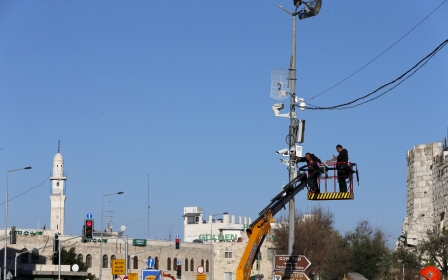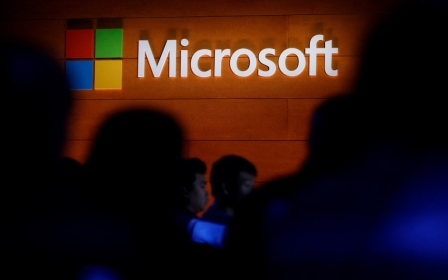Israeli settlers break into al-Aqsa compound a day before Eid al-Adha
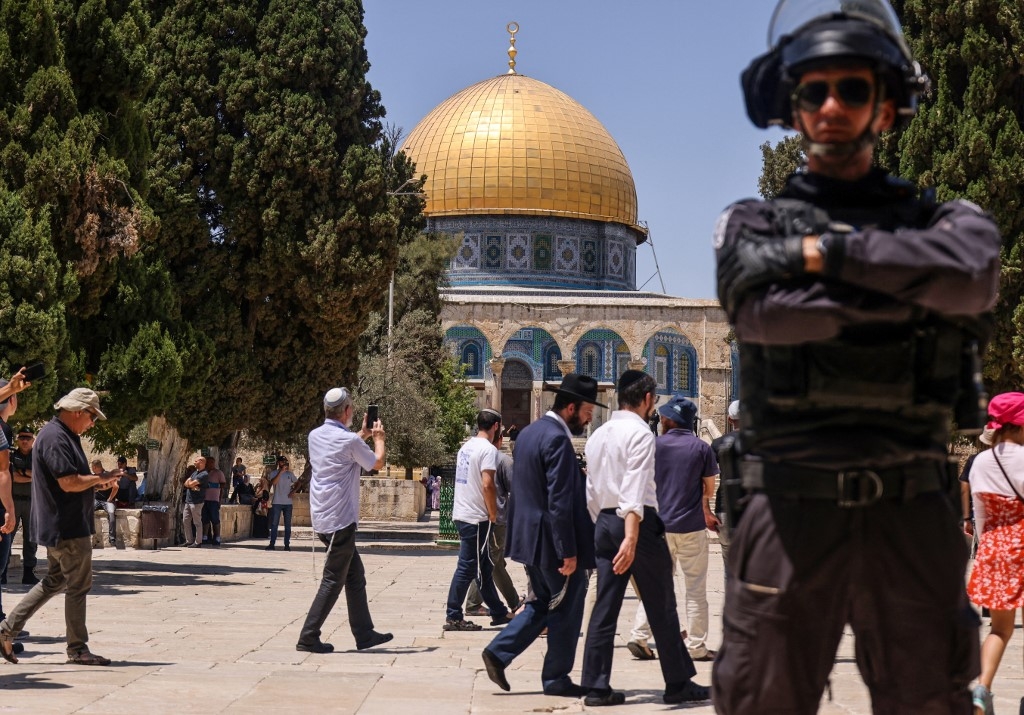
Dozens of far-right Israeli settlers broke into Jerusalem's al-Aqsa compound on Monday, flanked by Israeli police, one day before the Muslim feast of Eid al-Adha.
Monday also marks the Day of Arafah, which is the holiest day in the Islamic calendar.
Israeli security units restricted the entry of Palestinians to the compound and flew a drone to monitor the area as the settlers entered.
Some Palestinians performed the dawn prayer at Bab Huta and Bab al-Asbat gates after Israeli police barred them from entering the mosque compound.
Local media reported that Israeli forces and military police maintained an increased presence in the Old City in occupied East Jerusalem, following a day of tension at the al-Aqsa compound.
On Sunday, almost 1,600 Israeli settlers entered the compound amid condemnation from Palestinians, Jordan and other countries such as Pakistan.
Dozens of Israeli police officers raided the site on Sunday through the Chain and Moroccan gates, before assaulting Palestinian worshippers attending prayers and making way for the entrance of hundreds of settlers, Palestinian news agency Wafa reported.
Some Israeli groups had called on the settlers to force their way into al-Aqsa Mosque on Sunday, as Israeli Jews fasted on Tisha B'Av, a day that marks the destruction of temples in ancient Jerusalem.
Israeli Prime Minister Naftali Bennett thanked security officials for "preserving freedom of worship for Jews on the Mount", referring to the Al-Aqsa compound.
Bennett then backtracked on Monday, confirming that "there is no change in the status quo", in the compound, following condemnation from Jordan, which is the custodian of Muslim and Christian holy sites in East Jerusalem.
'Respect the historical and legal status quo'
On Sunday, Jordan's foreign ministry had called on Israel "to stop its violations and provocations" in Al-Aqsa Mosque, adding that Israel should "respect the historical and legal status quo, respect the sanctity of the mosque and the freedom of worshipers, and respect the authority of the Jordan-run Jerusalem Endowment Department and Al-Aqsa Mosque Affairs".
In a statement, the Palestinian Authority said on Sunday that it held "the Israeli occupation government fully responsible for the escalation resulting from the Israeli incursion in the al-Aqsa Mosque complex in occupied Jerusalem", while the Gaza-based Hamas movement urged Palestinians to visit al-Aqsa Mosque in large numbers and to remain there until Tuesday's Eid al-Adha.
'Pakistan stands in solidarity with the government and people of the State of Palestine, and stands by their just demands'
- Pakistan's foreign ministry
A statement by Pakistan's foreign ministry condemned the Israeli incursion into Al-Aqsa on Sunday, saying that "Pakistan stands in solidarity with the government and people of the State of Palestine, and stands by their just demands".
Al-Aqsa Mosque is one of Islam's most revered sites and is also the holiest site in Judaism, with Jews referring to it as Temple Mount.
Israel occupied East Jerusalem, where al-Aqsa Mosque is located, during the 1967 Middle East war. It annexed the entire city in 1980, in a move never recognised by the international community.
Israeli far-right activists have repeatedly pushed for an increased Jewish presence at the site, despite a longstanding joint guardianship agreement between Israel and Jordan that bars non-Muslim prayer at the site.
Settlers backed by Israeli forces regularly break into al-Aqsa Mosque and tour around the Dome of the Rock, a mosque built in the seventh century by the Syrian Umayyad dynasty on Moriah Mount.
Middle East Eye delivers independent and unrivalled coverage and analysis of the Middle East, North Africa and beyond. To learn more about republishing this content and the associated fees, please fill out this form. More about MEE can be found here.


